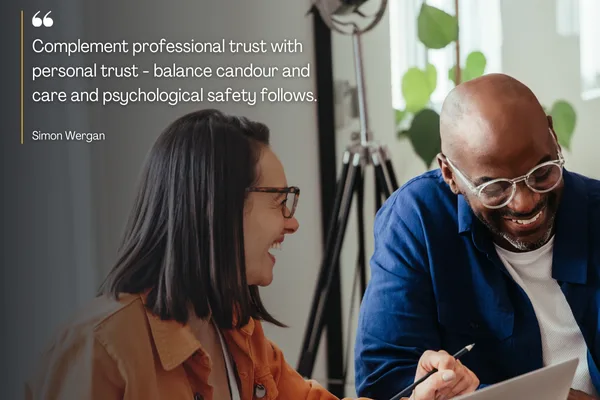In our first post, The Golden Age of Leadership Development: Three Hottest Topics, we explored the rise of psychological safety, science-backed learning, and the mindset of leadership as a choice. Now, we’re digging deeper into what truly brings high-performing teams to life: Trust, Candour, and Care.
These three principles are being redefined in today’s fast-moving, human-first world of work. Together, they form the foundation of modern leadership, creating cultures where people feel safe, supported, and inspired to show up at their best.
1. Trust: Beyond Psychological Safety
Psychological safety and trust go hand in hand, but they’re not the same thing. Psychological safety is about creating a space where people feel safe to speak up, take risks, and be vulnerable without fear of blame. Trust, on the other hand, is the deeper confidence that leaders will act with integrity, fairness, and follow-through.
Most organisations optimise professional trust – capability and credibility. But high-performing teams go further and deliberately build personal trust too: the day-to-day candour and care that make it safe to speak up, decide, and learn out loud.

For years, psychological safety was often boxed into DEI conversations. But that’s changing. A 2023 CIPD study confirmed what many L&D professionals already knew: psychologically safe teams don’t just feel better. They perform better (higher engagement, lower turnover, stronger collaboration). Building on Amy Edmondson’s research, Google’s now-iconic Project Aristotle came to the same conclusion: psychological safety is the #1 predictor of high-performing teams.
But trust is fragile. It can be quickly eroded by inconsistent leadership, lack of transparency, or punitive reactions to mistakes. That’s why the most impactful leadership programmes don’t just talk about psychological safety, they make it tangible. Through reflective activities, scenario-based exercises, and peer dialogue, participants explore what trust and psychological safety look and feel like in action, and from a range of perspectives.
Tools like psychological safety self-assessments or team heat maps can help leaders pinpoint areas for growth. Paired with an action plan, these insights give leaders practical ways to build safer, more open environments where ideas flow and people feel genuinely valued.
2. Candour: The Art of Honest Conversations
While most teams are built on good intentions and mutual respect, what often holds them back isn’t a lack of kindness, it’s a lack of candour.
Radical honesty can feel uncomfortable, but it’s the lifeblood of learning and growth. As Kim Scott highlights in her book Radical Candour, the best leaders are those who can “Care Personally” while “Challenge Directly.”
Scott’s framework maps out four types of feedback:
- Radical Candour: Direct and caring – it drives growth.
- Ruinous Empathy: Kind but avoids the hard truths.
- Obnoxious Aggression: Brutally honest, but without care.
- Manipulative Insincerity: Dishonest and self-serving.
Google’s Project Aristotle again backs this up. Teams that gave and received open feedback consistently outperformed those that tiptoed around difficult conversations.
So, what does this mean in practice? Leaders need to:
- Build regular feedback loops.
- Encourage healthy debate as a learning tool.
- Model it themselves, asking for, and acting on, honest feedback.
- Understand that candour isn’t about being harsh. It’s about being clear, kind, and committed to helping others grow.
3. Care: The Soft Power That Makes Trust and Candour Last
Care is the bit that makes leadership feel real. It’s noticing when someone’s not quite themselves, asking how they are, and meaning it. It’s remembering that every person in the room has their own story, pressures, and ambitions, and leading with that in mind.
The data backs it up. Businessolver’s 2025 State of Workplace Empathy report showed 27% of employees view their workplace as unempathetic, making them 1.5× more likely to switch jobs in the next six months, costing companies billions each year in lost talent.
But care isn’t just about being nice. It’s about making time to listen, asking better questions, and acting on what you hear. When leaders do that consistently, trust deepens, candour feels safer, and people know they matter. That’s when you start to see real loyalty, energy, and commitment.
Trust, Candour, Care Work Best Together
Great leadership isn’t about big speeches or perfect strategies, it’s about how you make people feel, every single day.
- Trust creates the foundation.
- Candour keeps things clear and honest.
- Care brings the heart that holds it all together.
When leaders combine all three, teams don’t just work well, they want to work together. And in a world where talent is more mobile than ever, that’s the real competitive edge.
View our Senior Leadership programme here.